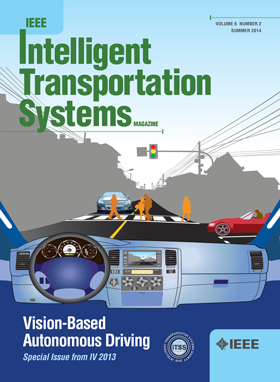Optimal Real-Time Bidding Strategy for EV Aggregators in Wholesale Electricity Markets
IF 7.9
1区 工程技术
Q1 ENGINEERING, CIVIL
IEEE Transactions on Intelligent Transportation Systems
Pub Date : 2025-02-10
DOI:10.1109/TITS.2025.3536857
引用次数: 0
Abstract
With the rapid growth of electric vehicles (EVs), EV aggregators have been playing an increasingly vital role in power systems by not merely providing charging management but also participating in wholesale electricity markets. This work studies the optimal real-time bidding strategy for an EV aggregator. Since the charging process of EVs is time-coupled, it is necessary for EV aggregators to consider future operational conditions (e.g., future EV arrivals) when deciding the current bidding strategy. However, accurately forecasting future operational conditions is challenging under the inherent uncertainties. Hence, there demands a real-time bidding strategy based solely on the up-to-date information, which is the main goal of this work. We start by developing an online optimal EV charging management algorithm for the EV aggregator via Lyapunov optimization. Based on this, an optimal real-time bidding strategy (bidding function and bounds) for the aggregator is derived. Then, an efficient yet practical algorithm is proposed to obtain the bidding strategy. It shows that the cost of the aggregator is nearly offline optimal with the proposed bidding strategy. Moreover, the wholesale electricity market clearing result aligns with the individual aggregator’s optimal charging strategy given the prices. Case studies against several benchmarks are conducted to evaluate the performance of the proposed method.电力批发市场中电动汽车聚合器的最优实时竞价策略
随着电动汽车的快速发展,电动汽车集热器在电力系统中扮演着越来越重要的角色,它不仅提供充电管理,而且还参与批发电力市场。本文研究了电动汽车聚合器的最优实时竞价策略。由于电动汽车的充电过程是时间耦合的,因此电动汽车聚合商在决定当前的竞价策略时,有必要考虑未来的运行情况(如未来的电动汽车到达时间)。然而,在固有的不确定性下,准确预测未来的作战条件是一项挑战。因此,需要一种仅基于最新信息的实时投标策略,这是本工作的主要目标。本文首先通过李雅普诺夫优化,开发了一种针对电动汽车聚合器的在线最优电动汽车充电管理算法。在此基础上,推导了聚合器的最优实时竞价策略(竞价函数和竞价边界)。然后,提出了一种高效实用的竞价策略求解算法。结果表明,所提出的竞价策略使聚合器的成本接近离线最优。此外,在给定电价的情况下,批发电力市场出清结果与个体集成商的最优充电策略一致。针对几个基准进行了案例研究,以评估所提出方法的性能。
本文章由计算机程序翻译,如有差异,请以英文原文为准。
求助全文
约1分钟内获得全文
求助全文
来源期刊

IEEE Transactions on Intelligent Transportation Systems
工程技术-工程:电子与电气
CiteScore
14.80
自引率
12.90%
发文量
1872
审稿时长
7.5 months
期刊介绍:
The theoretical, experimental and operational aspects of electrical and electronics engineering and information technologies as applied to Intelligent Transportation Systems (ITS). Intelligent Transportation Systems are defined as those systems utilizing synergistic technologies and systems engineering concepts to develop and improve transportation systems of all kinds. The scope of this interdisciplinary activity includes the promotion, consolidation and coordination of ITS technical activities among IEEE entities, and providing a focus for cooperative activities, both internally and externally.
 求助内容:
求助内容: 应助结果提醒方式:
应助结果提醒方式:


